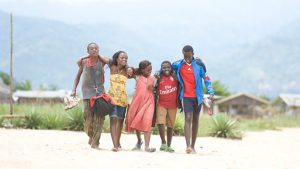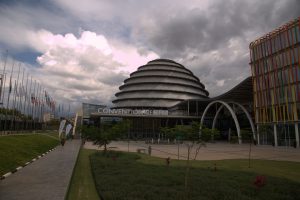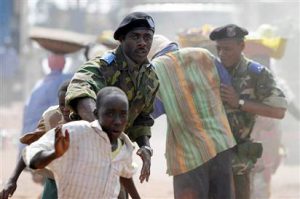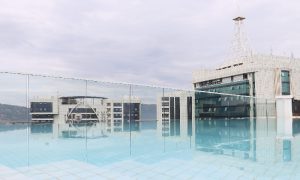Discussing Germany’s backing of Rwanda's Production Industry with Aimee Umutoni
To date, Rwanda has been sorely overlooked by the international film industry and as such, it is a plentiful resource of locations that has yet to be depicted on-screen. TLG spoke with Aimee Umutoni of the Deutsche Gesellschaft für Internationale Zusammenarbeit to uncover all that the country can offer to the international production community.
 What is the Deutsche Gesellschaft für Internationale Zusammenarbeit (GIZ) GmbH?
What is the Deutsche Gesellschaft für Internationale Zusammenarbeit (GIZ) GmbH?
The Deutsche Gesellschaft für Internationale Zusammenarbeit (GIZ) GmbH is a federal enterprise which supports the German Government in the field of international cooperation for sustainable development. We are also engaged in international education activities around the globe. Through our work we assist people and societies in shaping their own future and improving living conditions.
What are the objectives of GIZ’s Rwanda development aid programme?
Rwanda has maintained steady growth and macroeconomic stability for the past 15 years, between 2001 and 2015 real GDP growth averaged at about 8% per annum. However, the rate of unemployment and underemployment is high and most of those in employment still work in poorly paid positions, above all in agriculture. Although primary school attendance is comparatively high in Rwanda, the vast majority of youths leave school hardly equipped for the labour market.
The national development strategies concentrate on strengthening the private sector, improving technical and vocational education and training (TVET), and raising the employment rate.

Commissioned by the German Federal Ministry of Economic Cooperation and Development, the programme Eco-Emploi is part of the priority area 'Sustainable Economic Development' of the Rwandan-German Development Cooperation and will be implemented between June 2016 and May 2019. The programme’s objective is to increase employment shares of trained and qualified workers.
Eco-Emploi embodies an integrated approach of technical and vocational education and training, labour market interventions and private sector development. It supports the economic sectors ICT, wood economy, tourism and creative industries (particularly all audio-visual business). In the creative industry, several activities take place. Eco-Emploi not only teaches people the skills they need to enter the industry, it also works with potential teachers to broaden the education system in Rwanda.
 Please tell us about Rwanda as a film location
Please tell us about Rwanda as a film location
Although Rwanda is a small country (about the size of Switzerland), it offers a wide range of modern, urban and natural landscapes for shooting. It can double for modern capitals, lush jungles across the globe, tropical agricultural regions, idyllic hills and lakes and pristine wildlife settings while offering easy access from the capital Kigali, high levels of security and a moderate climate. Filming infrastructure is emerging in Rwanda. Small production companies are on hand to offer services for international projects.
What locations are most commonly used by film and TV crews when they come and film in the country?
Most productions shoot in Rwanda’s national parks for images of jungle wildlife. Films such as Sometimes in April (Raoul Peck, 2005), Africa United (Debs Paterson, 2010) and the documentary, Protecting the Beauty of Rwanda's Nyungwe National Park (CNN Inside Africa, 2015) have been shot in Rwanda. Since then the capital Kigali has raised new office buildings, hotels, shopping centres and residential areas that are yet to be captured on film.
 What are the rare, more unusual locations that Rwanda has to offer?
What are the rare, more unusual locations that Rwanda has to offer?
Rwanda offers new and futuristic architecture in Kigali, while being a least developed country with high population density at the same time. Some locations can feature both aspects simultaneously. Furthermore, Rwanda’s landscape with steep hills and beautiful lakes with islands is remarkable for Africa. High quality hotels in urban and jungle areas offer even more interesting locations.
Do you have any tips that you would like to share about filming in Rwanda?
Shooting permits are easy to obtain and can be issued within five working days. Immigration services are business friendly, accessible online and visas can be issued on arrival. Corruption is being fought by the government successfully - the country is very secure. It is safe to enter the streets during the day and at night time, by car and on foot.
International credit cards are widely accepted and money transfer is very easy. When it comes to pre-production, at least one week for location scouting and production management assessment is necessary before bringing in the production crew. Camera assistants, line producers and grips can easily be hired on the local market.
 What do you do with your time off and what would you recommend crew and cast do to visit, have fun and relax in Rwanda?
What do you do with your time off and what would you recommend crew and cast do to visit, have fun and relax in Rwanda?
Kigali, the capital of Rwanda, offers an exciting nightlife with different bars and clubs, international cuisines are also well represented. If you want to relax, Rwanda offers world class accommodation in pristine rainforests and on the shores of several beautiful lakes. Akagera National Park offers good opportunities for a daytrip safari starting from Kigali. Spending an hour with mountain gorillas in the Volcano National Park offers a unique and quite often life changing experience. To visit the gorillas, please plan three days of extra time in the country.
Related Posts
- Filming on location in Jackson Hole with Location Manager Ian Gersten
- Uganda: a fast growing, prime location for film productions
- On location in Berlin
- Scouting in Western Norway: Where high-tech structures meet epic natural landscapes
- Interview with Steve Solot, Executive Director of the Brazilian Film Commission Network
- On location with Michael Brook, Manager of Screen Auckland
- Location Scouting in Poland: Palaces, Underground Labyrinths and the best cheat for Berlin
- Filming in Luxembourg with location scout Christian Pannrucker
Related posts:
Comments
Not Logged in
You must be logged in to post a comment
There are no comments